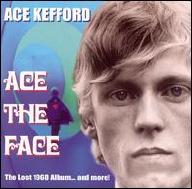Kefford left the Move in early 1968, after increasing instability resulting from depression and panic attacks. He recorded about an album's worth of unreleased material in mid-1968 with producer Tony Visconti (to become renowned for his work with David Bowie), but the project was abandoned, without production complete on many of the tracks, when Kefford had a breakdown. These sessions found Kefford writing much of the material and trying his hand at an assortment of late-'60s rock styles, as well as singing it in his soul-rock voice, which wasn't nearly as distinctive or capable as the vocals of, say, his old Move cohorts Carl Wayne and Roy Wood. Nine tracks from the unreleased album sessions, in their various states of (in)completion, were released in 2003 as part of the Ace Kefford CD compilation Ace the Face.
Kefford then became frontman for the short-lived Ace Kefford Stand, who did one single, For Your Love b/w Gravy Booby Jam, for Atlantic in 1969. The A-side was a drawn-out, heavy, and fairly tedious cover of the Yardbirds classic; the flip, thrown together by the band the night before the session, was a forgettable psychedelic-progressive rock crossover effort with freaky guitar. The other members of the Ace Kefford Stand, incidentally, had been previously known as Young Blood, and did four singles for Pye; the Ace Kefford Stand's most illustrious member was drummer Cozy Powell. After the single, Dave McTavish of Tintern Abbey joined and the band changed their name to Big Bertha, which did one single. Its A-side, This World's an Apple was, according to Kefford (quoted in Record Collector) "crap"; the flipside was Gravy Booby Jam, credited to Big Bertha Featuring Ace Kefford.
Kefford drifted in and out of music in the '70s, continuing to struggle with mental problems, at one time attempting suicide. Feelers put out to work with Ozzy Osbourne and Jeff Beck came to nothing, though he was briefly in the band Rockstar, who put out a 1976 single Mummy/Over the Hill. Both of those sides were written by Kefford, with the A-side in particular showing a strong, early-'70s David Bowie influence. All of Kefford's post-Move odds and ends were compiled on the Ace the Face CD, including the unreleased 1968 album sessions; the Ace Kefford Stand single, and a few Ace Kefford Stand outtakes; Big Bertha's This World's an Apple; the Rockstar single; and the Lemon Tree's William Chalker's Time Machine single. ~ Richie Unterberger, Rovi


















